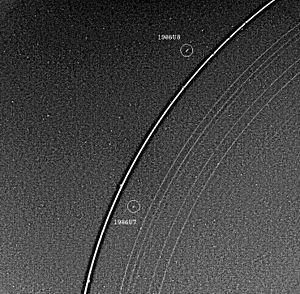Cordelia (moon) facts for kids

Cordelia (lower-middle, inside of bright ring), as imaged by Voyager 2
|
|
| Discovery | |
|---|---|
| Discovered by | Richard J. Terrile / Voyager 2 |
| Discovery date | January 20, 1986 |
| Orbital characteristics | |
|
Mean orbit radius
|
49751.722 ± 0.149 km |
| Eccentricity | 0.00026 ± 0.000096 |
| 0.33503384 ± 0.00000058 d | |
| Inclination | 0.08479 ± 0.031° (to Uranus' equator) |
| Satellite of | Uranus |
| Physical characteristics | |
| Dimensions | 50 × 36 × 36 km |
|
Mean radius
|
21 ± 3 km |
| ~5500 km² | |
| Volume | ~38,900 km³ |
| Mass | ~5.0×1016 kg |
|
Mean density
|
~1.3 g/cm³ assumed |
| ~0.0073 m/s² | |
| ~0.017 km/s | |
| synchronous | |
| zero | |
| Albedo | 0.08 ± 0.01 |
| Temperature | ~64 K |
Cordelia is the closest moon to the planet Uranus. Scientists first found it in pictures taken by the Voyager 2 spacecraft. This discovery happened on January 20, 1986.
Cordelia was first called S/1986 U 7. Later, it was officially named after Cordelia, a character from William Shakespeare's play King Lear. It is also known as Uranus VI. This small moon is about 148 kilometers (92 miles) wide. It is similar in size to Deimos, which is the smallest moon of Mars.
Discovering Cordelia
Scientists discovered Cordelia using images from the Voyager 2 probe. This spacecraft flew past Uranus in 1986. After its first sighting, Cordelia was hard to see again. It was not observed until 1997. The Hubble Space Telescope helped scientists find it again.
Cordelia's Orbit and Size
Cordelia orbits very close to Uranus. It is the innermost known moon of the planet. This moon helps to keep one of Uranus's rings, called the Epsilon Ring, in place. It acts like a "shepherd moon" for this ring.
Cordelia is not perfectly round. It has an irregular shape, measuring about 50 by 36 by 36 kilometers. Its average radius is around 21 kilometers. Because it is so small, its gravity is very weak.
What Cordelia is Like
Scientists believe Cordelia is made mostly of ice and rock. Its surface is quite dark. This means it reflects only a small amount of sunlight. The moon's surface temperature is very cold, around -209 degrees Celsius (-344 degrees Fahrenheit).
Cordelia is tidally locked with Uranus. This means the same side of the moon always faces the planet. This is similar to how Earth's Moon always shows us the same face.
See also
 In Spanish: Cordelia (satélite) para niños
In Spanish: Cordelia (satélite) para niños
 | Isaac Myers |
 | D. Hamilton Jackson |
 | A. Philip Randolph |

